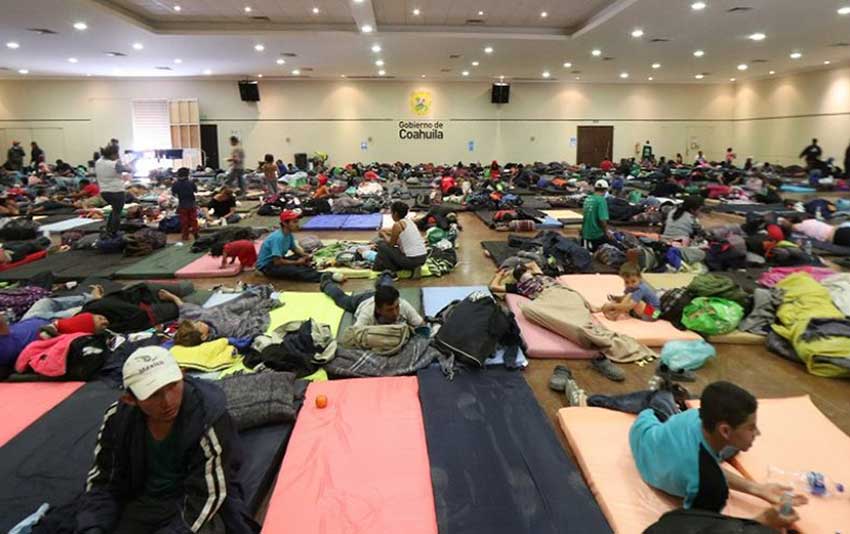NOTE FROM THE EDITOR:
Dear readers:
I am honored to introduce to you the following article, written by journalist James Corbett, about the current political standing of the United States of America, in relation to it’s capitalist-socialist status in terms of how it is viewed and what it really is. This is a must-read piece. — Marvin Ramírez.
by James Corbett
corbettreport.com
So it seems that something in Trump’s State of the Union speech has gotten the MAGA crowd all excited.
Was it this?
“My administration has acted decisively to confront the world’s leading state sponsor of terror: the radical regime in Iran. It is a radical regime. They do bad, bad things.”
Or this?
“Two weeks ago, the United States officially recognized the legitimate government of Venezuela — (applause) — and its new President, Juan Guaidó. (Applause.)”
Well, yes, probably. But the money quote that government cheerleaders will be shoving down your throat for years to come is no doubt this:
“Tonight, we renew our resolve that America will never be a socialist country.”
Ahhh, music to the ears of any freedom-loving, libertarian-minded opponent of technocratic government control, right? Right. At the very least it was enough to inspire some congratulatory articles from Trump’s base and launch a funny meme or two.
But hey, wait a minute. I’ve seen politicians lie about things before. Could it be possible—and bear with me, I’m just spitballing here—that this statement might be inaccurate? Why yes. Yes, it could. So let’s examine a few pesky little details that contain some harsh truths that the red cap crowd don’t want to hear.
Now before the socialists in the crowd chime in with the “No True Socialism” fallacy, let’s define our terms. Or better yet, let’s let the Dissembler-in-Chief define them:
“Here in the United States, we are alarmed by the new calls to adopt socialism in our country. America was founded on liberty and independence and not government coercion, domination and control. We are born free and we will stay free. Tonight, we renew our resolve that America will never be a socialist country.”
Yes, “socialism” is one of those slippery terms that can (and has) been defined a million different ways, but it’s pretty clear what way Trump is using it here. Socialism is government coercion, domination and control. Opposed to that is freedom from that control, i.e., political liberty and independence.
Alright, let’s take that definition as our starting point and see where it leads us.
If socialism is defined by government coercion, domination and control (in the name of “the people,” of course, i.e., “democratic socialism,”), then what do we call it when there are:
• Government agents dedicated to stopping farmers from selling raw milk?
• Enforcers of the state whose job it is to stop people feeding the homeless?
• Government licensing requirements for driving, fishing, cutting hair, getting married, selling lemonade, blogging, or engaging in literally thousands of other everyday activities?
• Government mandated geographical areas in which one can (or cannot) exercise one’s right to free speech?
• Entire sections of the US Code devoted to policing the size, style, color and order of the words “Turkey Ham” on every package of ham turkey (OOPS! I mean “Turkey Ham”), and any number of other products?
• Tax laws in place that tell the average worker how much of their income they are allowed to keep?
Need I go on? Oh, OK. Americans also need:
• Permission from the government to work.
• Permission from the government to travel.
• Permission from the government to play.
• Permission from the government to study.
Oh, and who can forget that Americans have:
A central bank owned by a gang of banksters who print the nation’s money into existence as debt owed back to themselves.
A legal code so extensive that the average American commits three felonies a day.
Intelligence agencies that record the entirety of every electronic communication flowing through the country (and then straight up lie to the American people about it).
And a president who reserves the right to kill anyone he wants, including American citizens, anywhere on earth, at any time.
But, please, do tell me about how “America will never be a socialist country.” Let freedom ring!
Now you may think that this is all just an aberration. That the overarching, all-controlling, all-seeing nanny state is a perversion of the “constitutional republic” that once existed. That, with a little luck and with the right dictator in charge of the system, the country can be returned to the vision of the founding fathers. That American can be made great again, if you will.
Well, I have some bad news for you on that front, dear Trump supporter. This isn’t an aberration. This is what government is. It is its nature. There is no political process that makes it better. You cannot vote yourself to freedom any more than slaves could vote their way off the plantation.
This is the point made by H.L. Mencken the better part of a century ago:
“The state—or, to make the matter more concrete, the government—consists of a gang of men exactly like you and me. They have, taking one with another, no special talent for the business of government; they have only a talent for getting and holding office. Their principal device to that end is to search out groups who pant and pine for something they can’t get, and to promise to give it to them. Nine times out of 10 that promise is worth nothing. The tenth time it is made good by looting A to satisfy B. In other words, government is a broker in pillage, and every election is a sort of advance auction sale of stolen goods.”
And this is the same point made by Lysander Spooner a century and a half ago:
“The principle that the majority have a right to rule the minority, practically resolves all government into a mere contest between two bodies of men, as to which of them shall be masters, and which of them slaves; a contest, that–however bloody–can, in the nature of things, never be finally closed, so long as man refuses to be a slave.”
Government, whatever form it may take, is by its nature a “socialist” system, at least in the sense intended by Trump in his speech. Its very existence depends on coercion, domination and control. Its raison d’être is to enforce a monopoly of power by the few over the many, and in its modern democratic socialist form it has even convinced those many that it “represents” them. That they are the government. And that the government will never be socialist.
Yes, I’m afraid I have to break it to those on the right side of the left/right delusion: your “leader” is wrong. Not only will America become a socialist nation, but it already is one. The government itself is proof of that.
Here’s how Trump could impress me. If he delivered this speech (courtesy of Pierre-Joseph Proudhon), officially disbanded the government, dropped the mic, and left Washington forever:
“To be governed is to be watched over, inspected, spied on, directed, legislated at, regulated, docketed, indoctrinated, preached at, controlled, assessed, weighed, censored, ordered about, by men who have neither the right, nor the knowledge, nor the virtue. … To be governed is to be at every operation, at every transaction, noted, registered, enrolled, taxed, stamped, measured, numbered, assessed, licensed, authorized, admonished, forbidden, reformed, corrected, punished. It is, under the pretext of public utility, and in the name of the general interest, to be placed under contribution, trained, ransomed, exploited, monopolized, extorted, squeezed, mystified, robbed; then, at the slightest resistance, the first word of complaint, to be repressed, fined, despised, harassed, tracked, abused, clubbed, disarmed, choked, imprisoned, judged, condemned, shot, deported, sacrificed, sold, betrayed; and, to crown all, mocked, ridiculed, outraged, dishonoured. That is government; that is its justice; that is its morality.”
But until that happens, don’t bother me with nice-sounding, meaningless political blather, OK?









